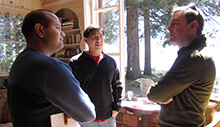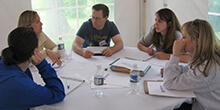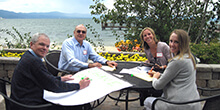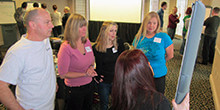Communication Training
Overview
Based on cutting-edge theory, yet implemented in highly practical and applicable ways, Adventure Associates provides Communication Skills workshops for the purpose of maximizing participants’ ability to understand and practice effective communication. The core principle to which all other facets connect is based in ensuring that messages are understood by receivers as intended by senders. The hallmark benefits of our Communication Skills programs include:
- Increased knowledge AND skills—especially grounded in sending, receiving, and feedback
- Increased ability to listen to divergent and contradictory input
- Improved ability to leverage various communication styles appropriate to various situations
- Improved observational and analytical skills (ability to see what’s needed)
- Improved ability to lead in a personalized, authentic manner rather than following formulas
Communication & Feedback Workshops
The art of effective speaking, listening and persuading.

Communication Skills
It’s easy to take communication skills for granted and dismiss them as part…

Emissary Process
It’s easy to focus on our differences—departments, functions, agendas, personal styles, physical barriers…

360 Degree Insights
In most organizations, feedback is a one-way street: downhill from supervisor to direct reports…

Interpersonal Feedback Skills
Working without feedback is like sailing without a compass…

Feedback Systems
Many of us dread performance reviews and employee evaluations. Feedback is often hard…
Training Methodology
Rather than relying on PowerPoint presentations and lectures, expect highly experiential, elicitive approaches for instilling knowledge and developing skills. Through a series of custom-designed challenges, participants face increasingly difficult (yet enjoyable!) scenarios that call upon effective communication skills in order to succeed. The facilitator(s) provide short presentations along the way, including revealing helpful models, tools, and tips. Most importantly, the facilitator(s) carefully guide participants through reflective pre and post-activity debrief discussions aimed at uncovering wisdom and strengths within the group. Such lessons are tracked and fed back in the form of a post-program report, followed by additional conversations about strategic follow-through. Key aspects of the methodology include:
- Non-formulaic; every program is customized to the group
- Inclusive and participatory activities conducive to full engagement
- Practice activities and scenarios
- Enjoyable and memorable experience
- Tailored to abilities and interests of team/group
- Deliberate sequencing of activities; skills developed incrementally
- Focused practice
Blend with Team Building
Every Adventure Associates workshop includes experiential (learn-by-doing) activities, regardless of duration. And, in order to fully understand, appreciate, and practice your communication skills, the following team building modules provide an ideal opportunity for taking risks with your new skills in order to be ready for action back in the “real world.”
- Bridge – Build a Bridge ignites your team’s creative energy as they move through the stages of designing, planning, building, troubleshooting and presenting their prototypes to the other teams.
- GeoTrek – GeoTrek, based on the recreational sport of geo-caching, blends adventure and technology into an exhilarating team building experience.
- TPC – Small teams work through a series of activity stations; each takes 30-45 minutes, including a focused discussion about how to maximize individual involvement, plan effectively, and which leadership and participation roles work best.
Variations
We tailor our leadership workshops for many types of groups and purposes, including:
Group Type:
- Leadership Team
- Group of Leaders (open enrollment)
- Project Teams
- Geographically Dispersed Teams/Leaders
- Virtual Teams
Context:
- Crisis Management
- Change Management
- Professional Development
- Organizational Development
- Leadership Incubator/Internal Recruitment (High-Potential Employees)
- Leadership Retreats




